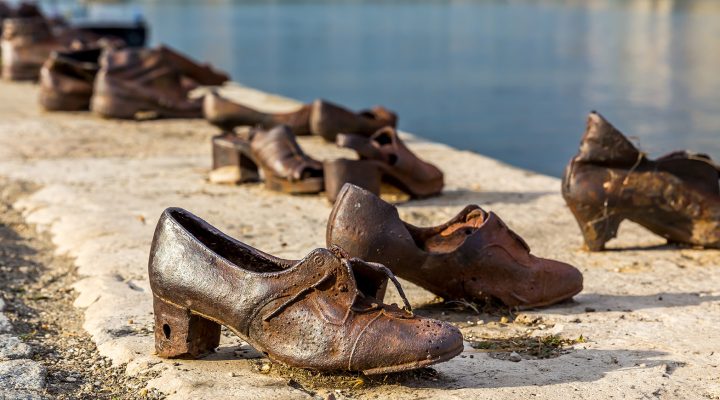First they came for the socialists, and I did not speak out — because I was not a socialist. Then they came for the trade unionists, and I did not speak out — because I was not a trade unionist. Then they came for the Jews, and I did not speak out — because I was not a Jew. Then they came for me — and there was no one left to speak for me.
Those words came from Lutheran pastor Martin Niemöller following Germany’s defeat in World War II. For his participation in the Confessing Church’s opposition to Nazi rule, Niemöller was imprisoned from 1937 to 1945. Early on, however, he supported Hitler and the Third Reich, believing the movement would create a new era of religious faith and practice.

Bill Leonard
At war’s end he wrote, “I hated the growing atheistic movement, which was fostered and promoted by the Social Democrats and the Communists. Their hostility toward the church made me pin my hopes on Hitler for a while. I am paying for that mistake now; and not me alone, but thousands of other persons like me.”
Niemöller’s maxim, “first they came for,” seems distressingly descriptive of the land of the free and the home of the inordinately vulnerable, 2023, where violent threats against a growing number of Americans appear increasingly prevalent. Consider these:
First they came for the Black Americans. An April CBS News report cites FBI data documenting a dramatic rise in hate crimes and noting that “African Americans were disproportionately represented, accounting for 30% of the incidents in which the bias was known.” Surveys from the UCLA Law School, the Southern Poverty Law Center and the Anti-Defamation League “reveal an increase in recent years in hate crimes and efforts to change classroom curriculums, attempts to make voting more difficult and extremist views being normalized in politics, the military and law enforcement” have significant racial impact.
Then they came for they came for the Jews. NPR reports: “Antisemitic incidents in the U.S. rose 36% in 2022, an annual audit by the Anti-Defamation League shows. The report, released last March, tracked 3,697 incidents of harassment, vandalism and assault targeting Jewish people and communities last year. It is the third time in five years the tally has been the highest number ever recorded since the ADL first began collecting data in 1979.”
Then they came for LGBTQ Americans. A May 11 report from the Department of Homeland Security says, “About 20% of all hate crimes reported throughout the country in 2021 were motivated by bias linked to sexual orientation and gender, citing the FBI’s hate crime statistics.” The agency noted certain culture-based issues “inspiring threats and calls of violence” against the LGBTQ community create possibilities for attacks on “larger targets” in the public square.
Then they came for election poll workers. An Aug. 31 PBS report noted the Justice Department unit charged with protecting those who manage elections recently indicted more than a dozen people for plotting such actions, including a Texas man sentenced to 3.5 years in prison for advocating the “mass shooting of poll workers and election officials” last year, including an online message that, “Someone needs to get these people AND their children. The children are the most important message to send.” The Brennan Center says the results of death threats and other violence have led to “a hollowing out (of) the ranks of experienced election administration professionals, with potentially more to come in the next year.”
Then they came for the teachers. An American Psychological Association task force on teacher-related violence found 44% of public school teachers reported experiencing a physical attack from students, while 75% reported student-based verbal harassment. The larger study documented death threats against teachers and their families, with personal items destroyed or stolen.
Then they came for the jurors. Georgia’s Fulton County Sheriff’s Department reported investigation of threats leveled at grand jury members who brought an indictment against former President Donald Trump after names and personal information were posted online. And a Sept. 19 Associated Press article states, “A self-proclaimed white supremacist pleaded guilty Tuesday to making online threats toward the jury and witnesses at the trial of a man who killed 11 congregants at a Pittsburg synagogue.” In court, the man acknowledged his perception of the Jewish faith prompted him to threaten jurors and witnesses.
Then they came for the school board members. In a Feb. 22 article, Reuters news service reported: “Local school officials across the United States are being inundated with threats of violence and other hostile messages from anonymous harassers nationwide, fueled by anger over culture-war issues.” Reuters studied 220 such threats in 33 boards across the country, including a member in Loudoun County, Va., whose daughter received a handwritten letter reading: “It is too bad that your mother is an ugly communist whore. If she doesn’t quit or resign before the end of the year we will kill her, but first, we will kill you.”
In 2023, threats made and acted upon are becoming a way of life (and potential death) throughout American society. At multiple levels of our national and communal life, these threats and others like them are evidence of the way in which the language of violence has become fearfully normalized. Given that escalating reality, how will Christians and their churches respond?
Martin Niemöller’ might ask: What will you do when the language of violence falls on you, if it hasn’t already?
First, Americans, especially those who claim to follow Jesus, should avoid and disavow the language of violence entirely, refusing, even implicitly, to normalize, minimize, defend or perpetuate violent threats under any circumstances. To do otherwise is to sully the very gospel we proclaim.
“Christians must distinguish violent language and its accompanying threats from nonviolent political and religious dissent.”
Second, Christians must distinguish violent language and its accompanying threats from nonviolent political and religious dissent. Violence itself is a means of threatening dissent itself, silencing those who challenge it. In his masterful work, Religious Dissent in America, the great historian Edwin Scott Gaustad writes: “Should a society actually succeed … in suffocating all contrary opinion, then its own vital juices no longer flow and the shadow of death begins to fall across it. No society — ecclesiastical, political, military or literary — can afford to be snared in its own slogans.” Gaustad cites Reinhold Niebuhr that “consent makes democracy possible, dissent makes democracy meaningful.” Christians must dissent against violent language and the threats it produces.
Third, we must not succumb to the rhetoric of those Christians who bend the language of Jesus toward violence. In a Nov. 14, 2022, article in Religion Dispatches, Mark Clatterbuck reports his experience at a ReAwaken America rally where certain right-wing pastors joined folks like Michael Flynn, Roger Stone, Mike Lindell and others in presenting dominionist and Christian nationalist demands for cultural and religious dominance.
Clatterbuck, reared in the movement, writes: “While forays into national politics and spiritual warfare rhetoric have long marked the NAR (New Apostolic Reformation) movement, the degree to which the dominionist theology of NAR has co-opted far-right political extremism, conspiracy theory culture and open calls for violence is both a novel and dangerous development. And this is a movement that is no longer confined to the fringes of American religious and political life.”
He concludes, “Underneath it all was a seething groundswell of spiritually sanctioned incitement to violence that was impossible to ignore. The spiritual leaders of this new religio-political movement are using increasingly violent rhetoric to direct an inspired army of God to wage war against all who stand outside their camp.”
Finally, efforts to turn the gospel toward violence demand our rigorous dissent in the church and the culture, and that may mean we too will receive threats. For if democracy is at stake, and it is, so is the meaning of the gospel in and for our times.
These days, let us cling to the words of the Great Dissenter: “You shall know the truth, and the truth will make you free.”
Then and now he’d surely add: “And it will get you threatened.”
Bill Leonard is founding dean and the James and Marilyn Dunn professor of Baptist studies and church history emeritus at Wake Forest University School of Divinity in Winston-Salem, N.C. He is the author or editor of 25 books. A native Texan, he lives in Winston-Salem with his wife, Candyce, and their daughter, Stephanie.


